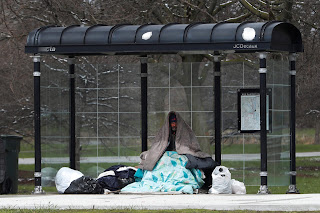No Ride No Problem: Portland’s Homeless and the Crucial Role of Transportation Access
Portland, despite being known for its vibrant culture and progressive values, is not immune to the challenges faced by its homeless population. One pressing issue is the necessity for improved access to transportation, which plays a vital role in providing opportunities for work and the potential to relocate for better prospects. However, the city and many of its residents have concerns regarding homeless individuals taking advantage of public transportation. With so many complex needs and circumstances that are involved in this issue I feel it is important to shed light on the commendable efforts of programs like Homeward Bound and the Portland Rescue Mission who are working to address these challenges.
For Portland's homeless population, access to transportation is more than just a convenience – it's a lifeline to employment opportunities, social services, and the chance to break free from the cycle of homelessness. Many individuals are unable to secure employment due to a lack of reliable transportation which limits their ability to regain stability and independence.
While public transportation is an essential resource, the city is struggling with the fact that some homeless individuals are misusing these services. This poses a dilemma for authorities seeking to balance the needs of the homeless while ensuring the safety and efficiency of public transit for all passengers.
One of the common needs for transportation is to get back home or to where homeless individuals have opportunities outside of the city. Thankfully, Portland has approved the Homeward Bound program which is committed to granting transportation to those who can verify that they have secured a place to stay and have plans of employment. According to Portland’s Housing Bureau Director Kurt Creager their plan is to “not (just) export the problem to another community. We’re trying to end homelessness…not move homelessness.” (Creager, 2016)
Another impactful organization is the Portland Rescue Mission, which not only offers shelter and meals but also recognizes the significance of transportation. They collaborate with local businesses and organizations to help create opportunities for homeless individuals, facilitating their journey towards self-sufficiency.
As Portland continues to deal with the complexities of homelessness and transportation, it's important that the community comes together in support of innovative solutions. Collaborative efforts between local government, transportation agencies, and non-profit organizations are essential to finding a balance between meeting the needs of the homeless and ensuring the safety and integrity of public services.
The struggle for transportation is just one of the many challenges faced by Portland's homeless population. By addressing these issues directly and supporting programs like Homeward Bound and the Portland Rescue Mission, the community can contribute to creating a more inclusive and supportive environment for all of its residents. By doing this, the city of Portland can improve towards providing opportunities for every individual, regardless of their housing status.
For More Information, Click The Links Below To Understand the Leading Causes in Different Aspects
City buys First Bus tickets for Portland’s “Homeward bound” homeless ... (n.d.-a). https://www.oregonlive.com/portland/2016/05/portland_homeward_bound_homeless_get_first_free_bu s_ticket.html
TriMet grant helps transitioning homeless - portland rescue mission. (n.d.). https://portlandrescuemission.org/news/uncategorized/trimet-grant-helps-transitioning-homeless/
McNaught, S. M. (2020, November 2). How code purple plans to shelter the homeless amid covid-19. The News Journal. https://www.sussexcountian.com/story/news/local/2020/11/02/how-code-purple-plans-shelter-homeless-amid-covid-19/3721389001/




Comments
Post a Comment